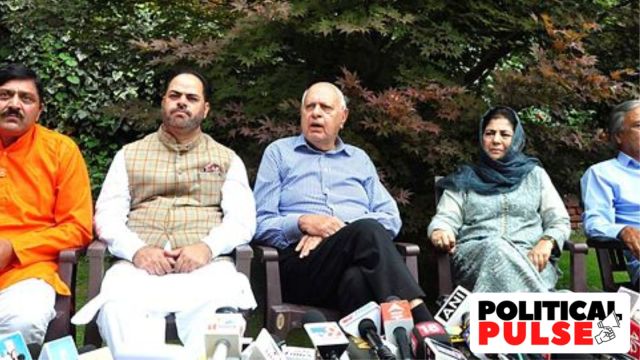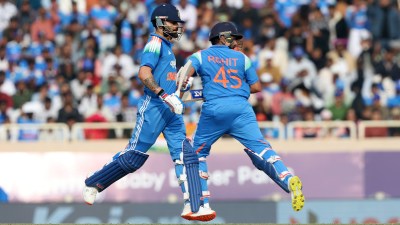Set to elect first govt after a decade, how J&K political landscape has changed
From the formation of a new tier of governance called DDCs to mainstream parties forming an alliance to demand re-establishing J&K as a state, a lot has happened since J&K last voted in Assembly polls in November 2014.
 A day before Parliament approved the sweeping changes in J&K, mainstream political parties in the Valley signed the Gupkar Declaration on August 4, 2019. (Express file photo)
A day before Parliament approved the sweeping changes in J&K, mainstream political parties in the Valley signed the Gupkar Declaration on August 4, 2019. (Express file photo)In the decade since Assembly elections last took place in Jammu and Kashmir, its political topography has undergone a significant shift following the abolition of Article 370 in 2019, its reorganisation as a Union Territory, and bifurcation.
Next month, in three phases starting September 18 — the fewest phases in the last two decades — the people of J&K will vote to elect their government for the first time since November 2014. One constant through all this, however, has been that regional parties continue to maintain their hold over the 87.09 lakh voters in the Kashmir Valley.
In June 2018, the BJP withdrew its support to the Peoples Democratic Party (PDP), bringing down their alliance government midway through its term. With Governor’s Rule in place and the subsequent dissolution of the J&K Assembly, panchayat and urban local body elections were conducted in October of the same year.
A new tier of grassroots governance termed the District Development Council (DDC) was launched in 2020. The DDCs are 14-member councils with elected representatives with a mandate to carry out developmental work in their constituencies. The panchayats and urban local body representatives managed to carry out work owing to the grassroots connect but the DDCs struggled to find their place amidst a struggle to work with the bureaucracy. Among the constant refrains of Pulwama DDC chairman Abdul Bari Andrabi was: “A ship has been constructed, then it has to be allowed to sail.”
The panchayats and the urban civic bodies ran their five-year course and fresh elections have not been announced while the DDCs are in the fourth year of their term, with many struggling to hold council meetings. Several DDCs have told The Indian Express they work individually based on what work they can get approved from their local district administrations while the bodies themselves do not hold meetings.
Gupkar Declaration and other parties
Meanwhile, a day before Parliament approved the sweeping changes in J&K, mainstream political parties in the Valley signed the Gupkar Declaration on August 4, 2019. Nearly every member of the mainstream political set-up in J&K was placed in detention, while three former Chief Ministers — Farooq and Omar Abdullah of the National Conference (NC) and BJP’s former alliance partner Mehbooba Mufti of the PDP — were booked under the Public Safety Act. The J&K Constitution was suspended and the J&K flag was removed from buildings along with other signs across the erstwhile state.
Months later, after these leaders were released, the signatories of the Gupkar Declaration formed the People’s Alliance for Gupkar Declaration (PAGD). This mainstream coalition was established as a “non-electoral” alliance to fight against the revocation of Articles 370 and 35A and for re-establishing J&K as a state. Since the Supreme Court ruled in favour of the Centre’s move in December 2023, the PAGD has become largely defunct, with the NC, the PDP, and the CPIM remaining its last remaining members. In the recent Lok Sabha elections, the NC and the PDP fought against each other and laid to rest any speculation of the PAGD’s future as an electoral possibility.
As the “Naya Kashmir” narrative fed by the Centre became common parlance, new political players also emerged. In March 2020, former J&K Cabinet MInister Altaf Bukhari, who was earlier with the PDP, announced the formation of the J&K Apni Party with several PDP dissidents. In the parliamentary polls, the party contested from Anantnag-Rajouri and Srinagar, finishing third in both.
Another political party that sought to break away from the traditional mainstream parties of the region was founded by former Congress leader Ghulam Nabi Azad. In September 2022, Azad announced the formation of the Democratic Progressive Azad Party. The party has so far failed to make a mark in the political canvas of Jammu and Kashmir.
In June 2021, Prime Minister Narendra Modi held a meeting with all political mainstream leaders of the Valley where he famously sought to bridge “dil ki doori, Dilli se doori”. However, there were no follow-ups to this meeting and in their visits to the Valley both the PM and Union Home Minister Amit Shah have continued to target the “teen parivar” that ruled J&K.
Meanwhile, on the ground, while arguments around Article 370 still inform much of the political discourse, there has been a yearning for political representation. The declining footfall in the civil secretariat, the lack of panchayat representation, and the fatigue with the “unapproachable” bureaucracy have all led to the people wanting their representatives and a functional Assembly for their day-to-day issues.




- 01
- 02
- 03
- 04
- 05



























